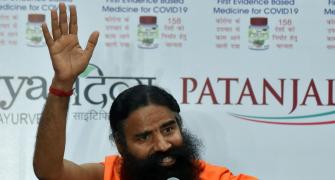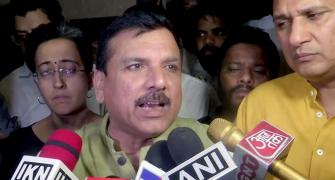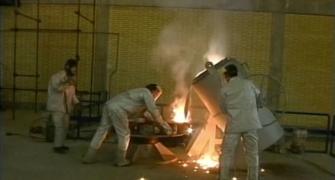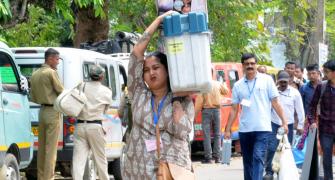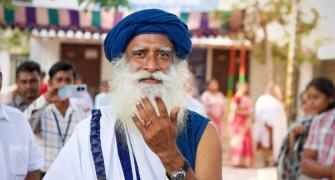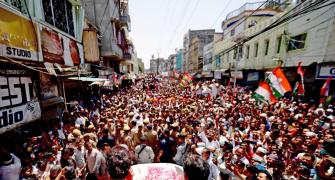The profiles of the founder members of the newly launched Lok Paritran political party are impressive. Tanmay Rajpurohit, the National President, studied aerospace engineering at IIT Mumbai before doing a Masters in it at Georgia Tech, US, and a Masters in Economics at New York University. Srikant Chakravarti is a young lawyer. Chandrasekhar is from IIT Kanpur; Ajit Ashwalayan Shukla, from IIT Mumbai; and Chief Advisor Santhanagopalan Vasudev holds a PhD in Economics from New York University.
After launching Lok Paritran a few months ago, the party has decided to plunge into the assembly elections by contesting in Tamil Nadu, Pondicherry and Kerala.
28-year old Santhanagopalan Vasudev, who did his schooling in Singapore and higher education in America is Lok Paritran's candidate in one of the most literate constituencies in Tamil Nadu -- Mylapore. He is pitted against the All India Anna Dravida Munnetra Kazhagam's S Ve Shekhar and the DMK's Napoleon. Rediff.com's Shobha Warrier caught up with Vasudev to ask him about his party's long-term plans.
Was starting Lok Paritran an impulsive decision, or a move planned for quite a while?
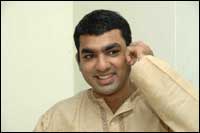 It was not an instantaneous decision. A group of us some in America, some in India had been discussing the state of the country for quite a while. All of us in the US wanted to come back to India eventually. Essentially, the decision to start Lok Paritran came about because we wanted to do something for the country.
It was not an instantaneous decision. A group of us some in America, some in India had been discussing the state of the country for quite a while. All of us in the US wanted to come back to India eventually. Essentially, the decision to start Lok Paritran came about because we wanted to do something for the country.
There are certain things we decided are very important before doing anything on any scale. We have to take care of things like public health and education which, according to us, are very basic issues. When we did social work, we tried to set up health camps.
When conscientious people want to do something for the country, what they do is social work. But you people chose to plunge into politics
We found that whenever we tried to do something in a big way, we ran into two problems -- both relating to the political system. Either you have to change certain laws to get things done, or you actually run up against the political system.
For instance, this person from Rajasthan was digging wells. He was beaten up and there were a number of hassles created for him. Tanmaya, our President, was thrown in jail for two days with no charges specified. That was just because he was conducting health camps, and got too popular in the area for local bigwigs to approve. All these factors together made us realise that we have to be in the system. You cannot be in one area and leave another aside.
Getting into the political system is quite different from doing social work though.
Yes, it is quite different. But we have planned a lot. And, we are not being too hopeful. A lot of us have worked at the grassroots level, and have met a lot of people. What I see as stumbling blocks in the Indian system is the implementation of ideas. So, our major thrust will be in providing a corruption-free government and making it more efficient.
Compared to the existing political parties that have money and muscle power, are you not being very idealistic? Are you aware of the ground realities involved in the political system?
Most of my friends have a very good idea of what happens at the ground level. As for me, I was studying in the US for quite some time.
Is this assembly election a bit like testing waters for Lok Paritran?
We have found that we are getting a lot of support, and many people are responding to us. So, it has become much more than testing waters. We have a serious opportunity and a serious responsibility.
How hopeful are you about your chances in this election?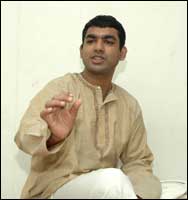
I would rather not think about this election too much. But if we do our campaign in the right way, we have a good chance. If, as we suspect, people are looking for a change, we have a chance. A lot depends on the people we are targeting. In the last elections, only 41 per cent voted, which is a drop of around 16 per cent. If we could bring those people who have stopped voting to the polling booths, we can succeed. We are trying. I have spoken to students, the youth, and found them very responsive. A lot of them have not voted; either they are first time voters or non-voters. This is the segment that is attracted by our profile.
Many understand that we are not after power. If that was the case, I would have stayed in the US and taken a job for $50,000 a year, leading to $300-400,000 a year. They understand that you don't leave all this and come back for power. It is for an ideology.
After the elections, will you be here irrespective of the results? Or will you go back to work in the US?
We will be here because we have long-term plans for the next 15 years. We want to have significant power at the centre in the next 15 years so we can do what we do. We are a national party. We will set up bases in many places in India. Then, we go to the next elections. We have the Gujarat elections coming in 2007. We have set plans for the next 5-7 years.
What about livelihood?
We are getting support and will continue to get support.
Photographs: Sreeram Selvaraj

